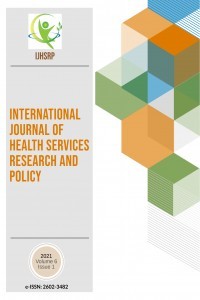ASSOCIATION BETWEEN RISK FACTORS AND COGNITIVE IMPAIRMENT AMONG TYPE 2 DIABETES MELLITUS PATIENTS
ASSOCIATION BETWEEN RISK FACTORS AND COGNITIVE IMPAIRMENT AMONG TYPE 2 DIABETES MELLITUS PATIENTS
Cognitive impairment, Type II diabetes mellitus, MMSE, Risk factors, TNF-α,
___
- 1. M. Stumvoll, B. J. Goldstein, and T. W. van Haeften, “Type 2 diabetes: principles of pathogenesis and therapy,” Lancet, vol. 365, no. 9467, pp. 1333–1346, 2005.
- 2. P. Zimmet, K. G. Alberti, and J. Shaw, “Global and societal implications of the diabetes epidemic,” Nature, vol. 414, no. 6865, pp. 782–787, 2001.
- 3. G. J. Biessels, I. J. Deary, and C. M. Ryan, “Cognition and diabetes: a lifespan perspective,” Lancet Neurology, vol. 7, no. 2, pp. 184–190, 2008.
- 4. J. Tang, Y. Pei, and G. Zhou, “When aging-onset diabetes is coming across with Alzheimer disease: comparable pathogenesis and therapy,” Experimental Gerontology, vol. 48, no. 8, pp. 744–750, 2013.
- 5. R. Stewart and D. Liolitsa, “Type 2 diabetes mellitus, cognitive impairment and dementia,” Diabetic Medicine, vol. 16, no. 2, pp. 93–112, 1999. 6. T. Cukierman, H. C. Gerstein, and J. D. Williamson, “Cognitive decline and dementia in diabetes–systematic overview of prospective observational studies,” Diabetologia, vol. 48, no. 12, pp. 2460–2469, 2005.
- 7. R. H. X. Wong, A. Scholey, and P. R. C. Howe, “Assessing premorbid cognitive ability in adults with type 2 diabetes mellitus–a review with implications for future intervention studies,” Current Diabetes Reports, vol. 14, no. 11, p. 547, 2014.
- 8. H. J. Lee, H. I. Seo, H. Y. Cha, Y. J. Yang, S. H. Kwon, and S. J. Yang, “Diabetes and Alzheimer's disease: mechanisms and nutritional aspects,” ClinNutr Res., vol. 7, no. 4, pp. 229– 240, 2018.
- 9. C. Qiu, B. Winblad, and L. Fratiglioni, “The age-dependent relation of blood pressure to cognitive function and dementia,” Lancet Neurology, vol. 4, no. 8, pp. 487–499, 2005.
- 10. O. Hansson, H. Zetterberg, P. Buchhave, E. Londos, K. Blennow, and L. Minthon, “Association between CSF biomarkers and incipient Alzheimer's disease in patients with mild cognitive impairment: a follow-up study,” Lancet Neurology, vol. 5, no. 3, pp. 228–234, 2006.
- 11. Roy S, Kim N, DesaiA, Komaragiri M, Baxi N, Jassil N, et al. Cognitive function and control of type 2 diabetes mellitus in young adults. N Am J Med Sci 2015;7:220 6.
- 12. Khullar S, Kaur G, Dhillon H, Sharma R, Mehta K, Singh M, et al. The prevalence and predictors of cognitive impairment in type 2 diabetic population of Punjab, India. J Soc Health Diabetes 2017;5:47 53.
- 13. Solanki, R K., Dubey V, Munshi, D. Neurocognitive impairment and comorbid depression in patients of diabetes mellitus. Int J Diabetes DevCtries 2009;29:133 8.
- 14. Cukierman Yaffe T, Gerstein HC, Williamson JD, Lazar RM, Lovato L, Miller ME, et al. Relationship between baseline glycemic control and cognitive function in individuals with type 2 diabetes and other cardiovascular risk factors: The action to control cardiovascular risk in diabetes memory in diabetes (ACCORD MIND) trial. Diabetes Care 2009;32:221 6.
- 15. Munshi M, Grande L, Hayes M, Ayres D, Suhl E, Capelson R. Cognitive dysfunction is associated with poor diabetes control in older adults. Diabetes Care 2006;29:1794 9.
- 16. Li X, Jia S, Zhou Z, Jin Y, Zhang X, Hou C, et al. The role of Montreal Cognitive Assessment (MoCA) and its memory tasks for detecting mild cognitive impairment. NeurolSci 2018;39:1029 34.
- 17. Luchsinger JA, Palmas W, Teresi JA, Silver S, Kong J, Eimicke JP, et al. Improved diabetes control in the elderly delays global cognitive decline. J Nutr Health Aging 2011;15:445 9.
- 18. Liu XY, Li L, Xiao JQ, He CZ, Lyu XL, Gao L, et al. Cognitive training in older adults with mild cognitive impairment. Biomed Environ Sci 2016;29:356 64.
- 19. Sukontapol C, Kemsen S, Chansirikarn S, Nakawiro D, Kuha O, Taemeeyapradit U. The effectiveness of a cognitive training program in people with mild cognitive impairment: A study in urban community. Asian J Psychiatr 2018;35:61 6.
- Yayın Aralığı: Yılda 3 Sayı
- Başlangıç: 2016
- Yayıncı: Rojan GÜMÜŞ
Bilal İLANBEY, Duygu ZORLU, Hacı Mehmet ÇALIŞKAN, Zamir Kemal ERTÜRK, Burak ÇELİK, Süleyman ERSOY, Kenan GÜÇLÜ
Sebahat ATEŞ, Havva KAÇAN, Fatma AYHAN, Azzet YÜKSEL
BASIC PARAMETERS OF LENS DESIGN
Alev YILDIRIM KESKİN, Sibel ŞENTÜRK, Zeynep Büşra TEKE
ASSOCIATION BETWEEN PSYCHOLOGICAL UPSET AND IRRITABLE BOWEL SYNDROME AMONG NURSING STUDENTS AT KSA
Manal SOLİMAN, Shereen AHMED QALAWA
THE RELATIONS BETWEEN FEAR OF COVID-19, ANXIETY OF DEATH, AND MEANING OF LIFE AMONG NURSING STUDENTS
ASSOCIATION BETWEEN RISK FACTORS AND COGNITIVE IMPAIRMENT AMONG TYPE 2 DIABETES MELLITUS PATIENTS
Mir ABDUL MUNİF, Laxman VERMA, Malik FAİZAN AHMAD, Anas Ahmad KHAN, Ankıt SİNGH
Udit DAVE, Ashwin PALANİAPPAN, Emma LEWİS, Brandon GOSİNE
Djıeukap LAURELLE, Herman Parfait AWONO-AMBENE, Christophe ANTONİO-NKONDJİO, Bienvenu BALİFELİ, Chi Tchampo FRU, Cyrille NDO, Nicolas Félicien DOLOGUELE, Serge Hubert ZEBAZÉ TOGOUET, Flobert NJİOKOU
